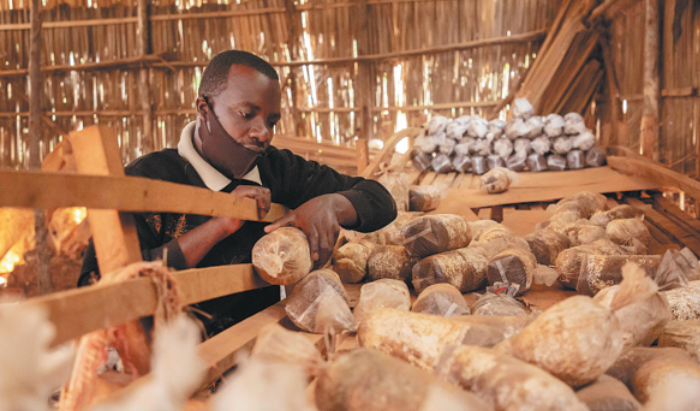
KIGALI, Rwanda — At an exhibition stand during an agriculture show in Rwanda’s capital Kigali, Emmanuel Ahimana said it is an exciting time to be involved with China’s Juncao cultivation technology.
His company, which operates in Kigali’s Gasabo district, uses the Chinese-invented Juncao technology to grow mushrooms with low-cost materials such as Juncao powder, cotton husks and lime powder.
After learning the technology, Ahimana established a mushroom cultivation workshop in 2016, employing dozens of people. The workshop produces up to 10,000 mushroom tubes monthly. His goal is to expand the business with modern machines and open several shop outlets around Kigali to sell mushrooms.
Juncao is a hybrid grass and an important multifunctional agricultural resource developed and used for mushroom farming in China. The innovation invented by Lin Zhanxi from China’s Fujian Agriculture and Forestry University in the 1980s has benefited more than 100 countries, including Rwanda.
Ahimana is one of more than 4,000 Rwandan farmers making use of Juncao technology, employing more than 30,000 people in the agricultural value chain, according to the Rwanda Agriculture and Animal Resources Development Board.
Leonidas Mushimiyimana, another Rwandan farmer, said the Juncao technology has made a big influence on his community.
He started mushroom production after receiving training from Fujian Agriculture and Forestry University and capacity-building workshops from the United Nations Department of Economic and Social Affairs.
This came at a time when a solution was needed to address local challenges such as poverty, child malnutrition and youth unemployment.
Mushimiyimana said he used the income from his Juncao mushroom production to build a school, which has improved education and economic opportunities in his community.
Since 2006, experts from Fujian Agriculture and Forestry University have been working with the Rwandan government on Juncao technology, teaching and promoting Juncao and other agricultural technologies in the country.
To date, more than 50 training courses on Juncao mushroom cultivation technology have been organized, benefiting more than 35,000 local mushroom farmers, official data showed.
By supporting mushroom cultivation, the innovation has promoted food security and the transition to a green economy through environmentally friendly technology and more sustainable agriculture, said Egide Karuranga, an economist in Rwanda.
Juncao has played an important role in building resilience to climate change, Karuranga said, adding it has also helped combat land degradation by producing fodder for livestock and minimizing soil erosion.
“Juncao technology has been a success, which demonstrates the need to invest in science and technology,” Karuranga said, highlighting the technology’s transformative power in changing the lives of various communities.
XINHUA


